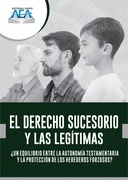Explore

El derecho sucesorio y las legítimas: ¿Un equilibrio entre la autonomía testamentaria y la protección de los herederos forzosos?
Delia Paulina Samaniego-Quiguiri, Rosa Elizabeth Campoverde-Jiménez, David Santiago Astudillo-Bermeo, Pablo Fausto Urbano-Urbano, Hilda del Rocío Erazo-Domínguez, Xavier Edgar Puente-Heredia, Jaime Enrique Guano-Fogacho, Ricardo Paúl Aroca-Rivadeneira, Thelmo Fernando Yánez-Erazo, Wellington Amado Andachi-Trujillo
2024
0 Ungluers have
Faved this Work
Login to Fave
Inheritance law, a branch of private law, is concerned with regulating the transfer of property and rights belonging to a deceased individual to his or her heirs. This process, known as succession mortis causa, has as its main objective to harmonize the freedom of testamentary disposition of the deceased with the safeguarding of the forced heirs, those who are legally entitled to receive a portion of the inheritance. Within the scope of inheritance law, normative provisions are established governing the distribution of assets, as well as the criteria for the validity and formality of wills. In addition, the legitimate shares are defined, which represent the portions of the inheritance destined to be compulsorily reserved for the forced heirs. This branch of law plays a fundamental role in guaranteeing a fair and equitable distribution of the assets and rights of a deceased person, while protecting the rights of the forced heirs and respecting the testamentary will of the deceased.
This book is included in DOAB.
Why read this book? Have your say.
You must be logged in to comment.
